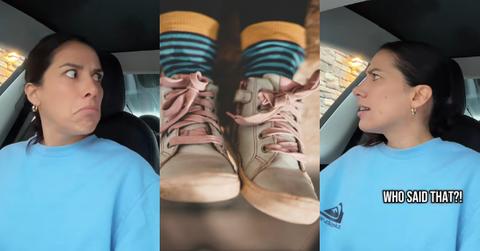"They Told You 100 Times What Hurt Them" — Woman Explains Why Millennials Go No Contact With Parents
"That's 679k too many millennials that can relate. Yikes."
Published July 23 2025, 12:55 p.m. ET
A woman claims that self-victimization is the reason why many millennials are alienating themselves from their parents.
Becca (@reallybecca_) posted a viral TikTok clip that's accrued over 10.4 million views, blaming a distinct behavioral pattern of estrangement between adult children born between 1981 and 1996 and their folks.
In the video, she asserts that this learned behavior of denial and self-isolation is inherited from their parents. It's born from children attempting to express feelings of insecurity, fear, or harm to their mothers and fathers.

Subsequently, she propounds that common reactions from millennial kids' parents are deeply rooted in guilt. For example, when kids disagree with or question their parents' motives, they are met with diatribes that often highlight all of the care parents put into rearing their children.
Millennials going no contact with their parents is not because they are ungrateful.
Consequently, these parents then absolve themselves from any challenges or blame issued by their kids. In turn, this promotes a sense of disaffection between child and parent, and as these kids grow older, they don't want to share the particulars of their lives or true thoughts and feelings.
Because when they do, all they're met with is a narrative that they're being ungrateful for all of the work that their parents put into making sure that they stayed alive. Instead of just hearing their kids out and proverbially walking them through their concerns, they just stymie any attempts at honest communication.
Becca covers this topic with a monologue she records whilst sitting by herself in a car. She speaks with her face turned towards the window as she covers up a portion of her countenance as she narrates the following. "Your millennial child going no contact with you isn't because they're ungrateful you fed and watered them for 18 years," she avers in the clip.

"It's because they told you 100 times what hurt them, and instead of listening, you played victim, became emotionally abusive, and then they had to set a boundary to protect themselves the way you wouldn't protect them."
Many in the comment section of the video could relate to Becca's claim, sharing their own examples.
"'I guess I’m the worst parent in the world.' My manipulative parent when confronted," one wrote before another added, "Or they say, 'I don’t remember that happening.'"
Guilt-based parenting can have negative effects on your children's mental health.
Guilt-tripping dynamics have been discussed in a variety of outlets that delve into this specific child/parent dynamic. A Fine Parent writes that implementing guilt-based techniques in order to induce compliance with your child can have deleterious effects on their mental health.

At the onset of the piece, they highlighted several examples, such as referencing how much they work as a parent in order to get their children to do chores.
Other guilt-based criticisms can come in the form of diminishing a child's maturity and/or intelligence.
The outlet writes that "Guilt is a powerful emotion and can, therefore, be a powerful tool of manipulation." This makes guilt an easy tool to use on developing minds to get them to comply with your wishes.
Even if you're trying to get your kid to get ready to engage in an activity you know they will love and are, let's say, distracted by playing with toys, making them feel terrible about being distracted may indeed have them get ready for said activity.

However, A Fine Parent writes that the end doesn't always justify the means. And that guilt-tripping someone into doing something creates a cycle of self-abuse and an unwillingness to do things for themselves out of love, fearing that they'll instead only engage in certain activities because they're afraid of disappointing their parents.
This HuffPost article also features some other ways parents are guilt-tripping their kids "without realizing it."
Instead of making kids feeling scared to make mistakes, encouraging them to instead be proactive about correcting or making up for something that they did was wrong is more conducive to personal development.
This way, they're not worried about making mistakes, everyone's human. But they're prioritizing how they can follow-through on an unfulfilled promise or fixing a situation they could've done a better job of amending.
Ultimately, the outlet writes that a parent's role is one of "coaching and teaching, not shaming and blaming."
